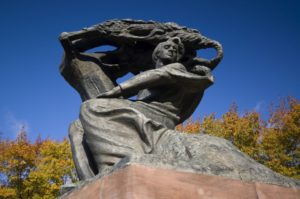2019. will mark 170 years from the death of the undoubtedly greatest Polish composer of all time, Frederic Chopin. Although, when it comes to Chopin there is no need for special anniversaries in order to remember him – his music is already being listened to and played worldwide every day. During the next week, Belgrade will have the lead regarding that, because another Chopin Fest is happening. For seven days the entire city will be covered by the sounds of the piano that will bring a special flavor to an already enchanting May evening air.
Frederic Chopin is considered to be an artist that ”reinvented” Polish music, brought a new way of piano playing and created a unique musical language ”spilling” into it, as a personal confession, everything that weighed on his soul. With Chopin’s music, the piano becomes the most wonderful and gentle instrument carrying a noble tone, at least until it releases its wild passion. That is when one needs to know how to tame it and that is why, among other things, ”playing the piano is a much more intimate act with Chopin”, as Daniel Barenboim described it.
What is it in the music of the ”poet of the piano” that still makes him exceptional and make us immediately think ”this is Chopin” when we hear it, even though we don’t know the piece we are listening to? The pianist Alexander Lonquich answered that question to a certain extent by saying that ”his music is immediately nostalgic for something that he probably never had. His music becomes poetry right away”.
Chopin ”cured” his extreme emotionality and his fragile soul by translating the two to the language of music. However, he gave another important characteristic to his pieces – the reflections of history. At least his own impressions of it while living far away from his homeland that was going through a stormy period before the long-awaited independence came in the 20th century. The Revolutionary etude is a perfect example of it. Barenboim recognized Chopin’s patriotism also in rhythm (and not just in polonaises and mazurkas) which is ”always a sign of a certain pride in music’” (adding that it is always a defensive pride, by no means offensive that you would expect from the Germans or Russians). ”There is something in this music that really belongs to them”, said the pianist remembering the words of the Polish ambassador that he was never more proud for being a Pol, after his concert. The musicologist Aleksander Laskowski describes the significance of Chopin’s music to the Polish people as being the embodiment of their ”national spirit during difficult times” (no wonder that the Nazis bombed his monument dating from 1926 – ”it gave to much strength to people”, he adds).

As for the rest of the world, Chopin’s music alone is enough regardless of the context in which it was created. Its influence never ends. Even when you’ve ”over listened” or ”overplayed” him, or you ”don’t love him” anymore, Chopin will again wake up some personal ”things” which you’ve thought you’ve surpassed. You never know what is going to happen with him, like Martha Argerich said when returning to his Piano Concerto no. 1 after ten years. Besides all the virtuosity, harmony richness and breathtaking cantilenas, simplicity is what always conquers the most, as Chopin is often quoted: (it) ”is the final achievement. After one has played a vast quantity of notes and more notes, it is simplicity that emerges as the crowning reward of art”. And really, fragments containing only a few melancholy notes that never repeat in the same way, are often enough to turn our whole world upside down, just like it happens with the Ballade no. 4.
There is something else recognizable in Chopin’s music, defined by only one word – rubato. The word that many associates with the free interpretation of time in music. Many – except probably Italians who are very well aware that the word rubato means ”stolen”, and every stolen time in music must be returned. Chopin, during the short period of time he spent on this world, mostly in deteriorating health, with a feeling of sorrow and nostalgia for the idyllic moments, stole the time in his music, so he could compensate it later with wide movements. The thing he didn’t have the chance to achieve in real life.
If you happen to be in Belgrade from 7th – 13th of May, heed our advice – steal a little time from your life and visit some of the Chopin Fest concerts. The best part of it is that you will not be needing the compensation.
Ivana Ljubinković
Check out the Chopin festival page on ClassicAll website